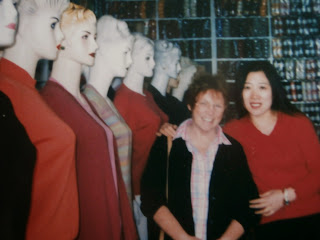Although it seemed to me a very difficult language, Chinese was also rewarding and I made an effort in Tonghua to find a teacher, so I could continue with my studies. However, I learned after our new UK colleague joined us that maybe I needn't have tried so hard.
In a way, I
envied the attitude adopted by my new UK
Ed, despite his Italian ancestry, didn’t speak a word of any
language other than English, and said he had
no gift for language learning and no
motivation because he could always get
by with gestures. He demonstrated this to hilarious effect one day when
he, Katharine and I went to the 'Bai Huo
Da Lou', Hundred Goods Big Shop' , or department store, to buy rubber bands.
Whilst I
looked vainly through my mini-dictionary
and Katharine was browsing the shelves, Ed was making stretching motions with
his hands at the puzzled salesgirls and repeating ‘Ping !
Ping !’
Eventually,
I found the word for rubber in the dictionary and managed in my halting Chinese
to say ‘used for holding things
together’. All at once the assistant
realised what I meant and produced a large bag full of rubber bands.
Then she turned round to her friends at the nearby counters, called out
something in Chinese and repeated ‘Ping ! Ping !’ They all
laughed, and Ed remarked cheerfully that these women at the stationery
department were always laughing at him.

